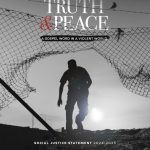A Call for Peace: Embracing Truth and Peace in a Violent World
16 August, 2024
 In 1963, Pope St. John XXIII issued the profound Encyclical Letter Pacem in Terris (Peace on Earth), appealing to the global community for an end to war and the elimination of nuclear weapons. This call was rooted in the belief that peace must be founded on the inviolable dignity of every human being. Today, the Australian Catholic Bishops Conference continues this mission with the 2024-2025 Social Justice Statement, Truth and Peace: A Gospel Word in a Violent World. The document reminds us that peace-making is not an optional part of our faith but a Gospel duty.
In 1963, Pope St. John XXIII issued the profound Encyclical Letter Pacem in Terris (Peace on Earth), appealing to the global community for an end to war and the elimination of nuclear weapons. This call was rooted in the belief that peace must be founded on the inviolable dignity of every human being. Today, the Australian Catholic Bishops Conference continues this mission with the 2024-2025 Social Justice Statement, Truth and Peace: A Gospel Word in a Violent World. The document reminds us that peace-making is not an optional part of our faith but a Gospel duty.
The Urgency of Peace
Pope Francis emphasises the urgent need for a global ceasefire, warning that we are on the brink of an abyss. The statement reflects on the devastating impact of totalitarian ideologies of the 20th century, which were rooted in falsehoods about God and humanity. These atheistic ideologies, like the serpent’s lie in Genesis, promised ultimate freedom but resulted in death and suffering as trust and peace were replaced with violence and war. “The last century was the most violent in human history, with the piles of corpses of Auschwitz and Hiroshima its demonic emblem. At the dawn of the new century and the third millennium there were hopes for a time of peace. But that was not to be.” In 2022, there were 55 state-based conflicts and 82 non-state conflicts worldwide, affecting two billion people. This statement calls attention to both well-known and overlooked conflicts, including those close to Australia.
Erosion of Truth in Modern Times
Pope Francis urges the youth to envision a new world of peace, despite the current challenges. The erosion of truth in our post-truth culture, fuelled by social media and misinformation, is a significant barrier to this vision. The post-truth world imposes “life in a bubble or an ideological echo-chamber” which can cause us to close in on ourselves and cling to our own positions and convictions. The rapid spread of fake news and conspiracy theories, coupled with the decline of trusted authorities and traditional journalism, has fragmented public discourse and undermined democratic processes.
The Way Forward: The Architecture of Peace
The statement calls for a return to truth and trust in the power of Christ, the Prince of Peace. By fostering a culture of encounter and dialogue, both at individual and societal levels, we can work towards a world that aligns with human aspirations and divine intentions. “A commitment to dialogue helps to break down the tendency for one person or group to amass power for themselves and instead to promote a commitment to the common good where there is true justice and respect for the dignity of all people.” The Australian bishops call on us to “welcome opportunities to listen to others and understand what they think and why.”
Educating for Peace
Peace is not something that happens by chance; it is a skill that can be taught and learned. Pope Francis emphasises the importance of education in promoting peace. Our schools play a vital role in this mission by teaching students the “architecture of peace” and fostering a culture of dialogue and encounter. In our parish, we can support these efforts by encouraging our educational leaders to prioritise peace education and by actively engaging with school initiatives that promote peace-making.
Action for Everyone
The statement asserts that “Peace is the work of everyone, and we can all do something to be peace-makers”. It provides some suggestions of simple, concrete ways that we, as individuals, can make a real difference as peace-makers.
- Start with yourself. Invite God to nurture peace in your heart. Examining the things that happened over the course of your day when you pray before bedtime is a good practice. Ask yourself how you responded to conflicts. Did you reach out in friendship and love to others, show kindness or offer or receive forgiveness? Ask God for the grace to make peace in your life.
- Prayer is essential to peace-making. At each Mass we pray for the gift of peace, and parishes might gather to pray for peace outside Mass, eg. by praying the Rosary.
- Take action on an issue that matches your passion and skills.
- Set up a group to read, discuss and pray about one of the Church documents referred to here, such as Pope Francis’ Fratelli Tutti, chapters 6 and 7.
- Make your views and concerns known to your local Member of Parliament.
- Give priority to encounter rather than taking action on a computer.
- Reach out to a local reconciliation group if you want to support First Nations Peoples, or a refugee support group or service if you want to work with refugees seeking justice.
- If you are interested in trying to address conflict in another part of the world, there may be ethnic community organisations from the conflict zone in your local community. You could reach out to them to learn more and to give them support. You could also offer to help Caritas Australia with its work in war-torn countries.
- Focus on listening more and talking less in your conversations.
- Learn about the culture and history of the people you are accompanying and supporting.
- Serve them by helping them do what they decide is a priority rather than coming to them with a plan.
- Ask the friends you make in these situations if they would like to share some of their experiences with your parish or school.
- Seek advice from them on what issues they are making a priority in their advocacy with governments.
- Come together regularly with others working in the same area to reflect prayerfully on the work you are doing for peace.
- Approach your local school to find out how it educates students to be peace-makers.
- Join an ecumenical or interfaith group which seeks to foster dialogue and peace-making.
The challenge of the statement is this: how do we as individuals and as a community work to better create a world of truth telling and peace making? Maybe we start with one action from above and work with others to spread the good news the Prince of Peace gave us. By committing to truth and dialogue, we can contribute to a more peaceful and just world. For further contemplation and action the full statement, Truth and Peace: A Gospel Word in a Violent World, will be available on the Australian Catholic Bishops Conference website following the launch of the statement on 20th August: https://socialjustice.catholic.org.au/2024/07/25/social-justice-statement-2024-25/

